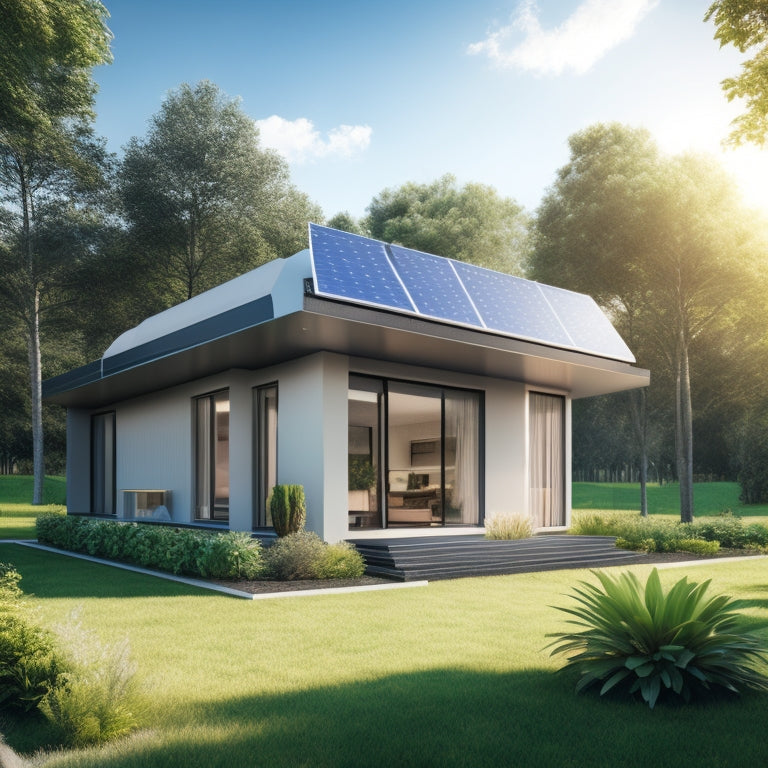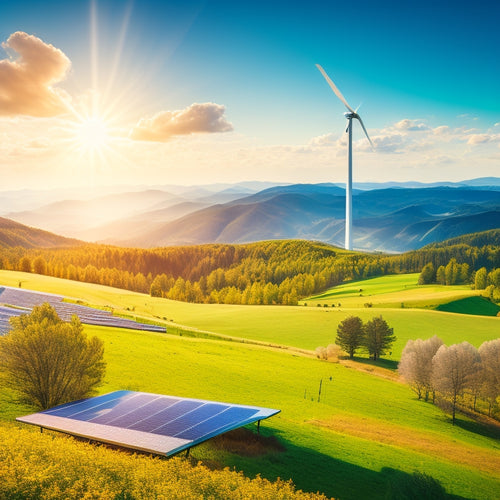
Solar Panel Energy Storage
Share
By integrating energy storage solutions with your solar panel system, you can obtain true energy independence, reduce your reliance on the grid, and maximize the benefits of renewable energy. You'll be able to store excess energy generated during the day for use at night, reducing your energy bills and carbon footprint. With advanced inverters, you can even sell excess energy back to the grid. In addition, lithium-ion batteries offer superior energy density and compatibility with sustainable solutions. As you investigate the world of solar panel energy storage, you'll identify how to optimize your system's performance, increase your property's value, and enjoy the financial benefits of going green - and that's just the beginning.
The Essentials
- Solar panel energy storage enables energy independence, making off-grid living feasible with integrated solar solutions.
- Advanced energy management capabilities of inverters enhance grid integration, allowing excess energy to be sold back to the grid.
- High-quality solar batteries enhance solar panel investment returns, ensuring minimal maintenance and efficient operation through smart technology.
- Lithium-ion batteries offer superior energy density compared to lead-acid batteries, allowing for more efficient space and weight utilization.
- The ideal Depth of Discharge (DOD) range for solar systems is between 20% and 80%, where discharging to 20% capacity and recharging at 80% maximizes efficiency.
Zero Energy Bills Possible
You can achieve energy independence today by utilizing the power of solar energy and storing it for later use.
With a well-designed solar panel energy storage system, you can generate your own electricity and reduce your reliance on the grid.
By incorporating renewable energy storage solutions, you can guarantee a continuous power supply even during power outages and grid failures.
This means you can enjoy zero-cost electricity, eliminating your energy bills and saving you money in the long run.
Energy Independence Today
Achieving energy independence today is a tangible reality, thanks to the rapid advancements in solar panel energy storage technology. You can now break free from the grid and enjoy the freedom that comes with generating your own clean energy.
Off-grid living is no longer a distant dream, but a feasible option for those seeking a sustainable future. With the help of integrated solar solutions like All in One Solar Power Systems, you can simplify the shift to renewable energy and guarantee a steady power supply even when the grid is down.
Renewable innovation has made it possible to utilize the power of the sun and store it for later use, giving you energy autonomy like never before.
With eco-friendly solutions like solar panel energy storage, you can reduce your reliance on fossil fuels and minimize your carbon footprint. Power independence is within your grasp, and it's more accessible than you think.
By investing in clean technology, you're not only reducing your energy bills but also contributing to a cleaner environment. Self-sufficient systems are the way of the future, and you can be at the forefront of this revolution.
Zero Cost Electricity
The prospect of zero cost electricity is no longer a distant dream, thanks to the innovative capabilities of solar panel energy storage systems. You can now utilize the power of the sun and store it for later use, reducing your reliance on the grid and your energy bills.
With solar incentives and decreasing installation costs, it's becoming more feasible to shift to a renewable future. In addition, a high-quality house solar battery, such as Tesla Powerwall, solves the problems of high electricity bills and power outages, allowing you to maximize your solar panel investment.
Smart technology and efficient system design guarantee that your solar panel energy storage system runs smoothly, with minimal battery maintenance required. By going off-grid, you'll not only reduce your financial burden but also minimize your climate impact.
Energy policies are adapting to support this change, and you can benefit from grid benefits like net metering. With a well-designed system, you can achieve zero cost electricity, enjoying the freedom and financial savings that come with it.
As you begin this expedition, you'll be contributing to a cleaner, more sustainable future.
Increased Property Value
When you install a solar panel energy storage system, you're not only generating clean energy, but you're also elevating your property's market appeal.
By choosing top-tier photovoltaic options like high efficiency solar panels, you can maximize energy efficiency and reduce your electricity bills.
This can lead to a significant increase in your property's value, making it more attractive to potential buyers if you decide to sell in the future.
Boosted Market Appeal
Nearly 80% of homeowners who invest in solar panels report a significant increase in their property's value. This enhancement in value isn't just a perceived benefit, but a tangible one that can be attributed to the increased appeal of your property in the market.
You'll be happy to know that solar panels are now a sought-after feature in homes, driven by market trends and consumer preferences. As a homeowner, you'll enjoy a competitive edge when selling your property, as buyers are willing to pay a premium for homes with solar panels.
In fact, studies have shown that solar panels can increase your property's value by up to $15,000. This increased appeal also translates to a faster sale, with homes equipped with solar panels selling up to 20% faster than those without.
Enhanced Asset Worth
Investing in solar panels effectively enhances your property's resale value, with a considerable portion of that value tied directly to the system itself. This increased asset worth can be attributed to the system's ability to provide a sustainable source of energy, reducing your reliance on the grid.
As you adopt sustainability practices, you'll not only reduce your carbon footprint but also elevate your property's appeal to environmentally conscious buyers. Additionally, government incentives, such as tax credits, can further raise the value of your property.
These incentives can considerably offset the initial cost of installation, making your investment even more attractive to potential buyers. When you decide to sell, you can expect to recoup a considerable portion of your initial investment, with some studies suggesting up to 97% of the total cost.
Inverter Synchronizes Energy Flow
You'll find that an inverter plays a vital role in synchronizing energy flow from your solar panel system, especially when it comes to off-grid power and guaranteeing a reliable backup system during outages.
It also enables homeowners to maximize their energy independence by storing excess energy generated during the day for use at night.
It guarantees seamless power transfer by converting DC power from the panels to AC power that's usable in your home, and it also optimizes energy harvesting by tracking the maximum power point of the solar array.
Seamless Power Transfer
The inverter, an essential component of your solar panel system, synchronizes energy flow to guarantee seamless power transfer between the solar panels, battery bank, and the electrical grid. This assures that you have a stable and reliable source of energy, regardless of the time of day or the amount of sunlight available.
With seamless power transfer, you can enjoy the benefits of renewable integration, load shifting, and peak shaving, all while maintaining grid stability.
As you generate energy, the inverter optimizes the system, predicting your energy needs through energy forecasting and adjusting output accordingly. This demand response guarantees that you're using the most efficient and cost-effective energy possible.
The inverter's smart grid capabilities also enable you to sell excess energy back to the grid, further increasing your energy resilience. By synchronizing energy flow, the inverter plays a critical role in assuring that your solar panel system operates at its best, providing you with the freedom and independence you desire.
Efficient Energy Harvesting
As your solar panel system generates energy, the inverter guarantees efficient energy harvesting by synchronizing energy flow between the panels, battery bank, and electrical grid. This synchronization enables ideal solar efficiency, ensuring maximum energy optimization.
By aligning panel performance with sunlight conversion rates, the inverter fine-tunes harvesting techniques to capture every available watt. As a result, you'll enjoy increased energy independence and reduced reliance on non-renewable resources.
The inverter's advanced energy management capabilities also facilitate seamless grid integration, allowing you to sell excess energy back to the grid and offset your consumption during periods of low sunlight.
Furthermore, the inverter's compatibility with various storage technologies enables you to store excess energy for later use, further enhancing your ability to utilize renewable resources.
Depth of Discharge Matters
When you're designing a solar panel energy storage system, you'll need to take into account the depth of discharge (DOD) of your batteries, as it greatly affects their lifespan.
A deeper DOD means you're using more of the battery's capacity, which can reduce its overall life. For instance, the Tesla Powerwall and other lithium-ion batteries are designed to optimize energy storage while minimizing degradation.
You'll want to aim for an ideal DOD range to balance energy storage needs with battery longevity.
DOD Affects Battery Life
Optimize your solar panel energy storage by understanding the critical impact of depth of discharge (DOD) on battery life.
You're likely aware that batteries have a limited number of discharge cycles before they start to degrade. However, what you mightn't know is that the depth of discharge greatly affects battery longevity.
When you regularly deeply discharge your batteries, you're reducing their overall lifespan. A deep discharge cycle can cause irreversible damage to the battery's internal chemistry, leading to a permanent loss of capacity.
This means that if you consistently drain your batteries to 80% or more, you'll notice a considerable decrease in their ability to hold a charge over time.
On the other hand, shallow discharges can help prolong battery life. By keeping your batteries within a moderate DOD range, you can guarantee they last longer and provide consistent energy storage for your solar panel system.
Ideal DOD Range
You've learned how depth of discharge affects battery life, and now it's time to determine the perfect DOD range for your solar panel energy storage system.
The perfect DOD range is critical because it directly impacts battery efficiency and overall system performance. Aiming for an ideal discharge range guarantees you're getting the most out of your batteries while minimizing wear and tear.
For most solar panel energy storage systems, a perfect DOD range falls between 20% and 80%. This means you should aim to discharge your batteries to 20% capacity and recharge them when they reach 80% capacity.
This range allows for efficient energy storage and minimizes the risk of over-discharging, which can greatly reduce battery lifespan. Staying within this range also helps prevent battery degradation, guaranteeing your system operates at peak performance over its lifespan.
Lithium-Ion Beats Lead-Acid
You'll find that lithium-ion batteries outperform lead-acid batteries with respect to energy density, storing more energy per unit of mass and volume.
This higher energy density translates to more efficient use of space and weight in your solar panel energy storage system.
With lithium-ion, you can pack more power in a smaller, lighter package, making it an attractive option for many applications.
Higher Energy Density
Your energy storage system's performance is heavily influenced by the type of battery used, and when it comes to higher energy density, lithium-ion batteries have a clear advantage over lead-acid batteries.
This is because lithium-ion batteries can store more energy per unit of weight and volume, making them ideal for renewable integration and grid stability. With higher energy density, you can achieve greater energy efficiency and optimize your system's performance metrics.
This means you can store more energy in a smaller space, reducing the environmental impact of your system. Moreover, lithium-ion batteries are more compatible with sustainable solutions, allowing for seamless load management and energy optimization.
In contrast, lead-acid batteries are bulkier and heavier, making them less suitable for modern energy storage systems. By choosing lithium-ion batteries, you can access the full potential of your solar panel energy storage system and enjoy greater freedom from the grid.
Frequently Asked Questions
How Does Energy Storage Work During Power Outages?
When the grid goes down, you'll rely on your energy storage system's battery management to prioritize outage preparedness, automatically disconnecting from the grid and supplying power to your essential loads, ensuring your independence and freedom during power outages.
Can I Use Solar Panels With an Existing Electrical System?
You're not alone - 85% of US homeowners consider solar panels a worthwhile investment! Fortunately, you can integrate solar panels with your existing electrical system, ensuring seamless solar panel compatibility and energy system integration, giving you freedom from grid dependence.
What Is the Typical Lifespan of Energy Storage Batteries?
You'll find that energy storage batteries typically last between 5-15 years, depending on factors like battery chemistry, usage patterns, and maintenance, with some lithium-ion batteries reaching up to 20 years, making them a reliable choice for your freedom-driven energy needs.
Are Energy Storage Systems Eligible for Government Incentives?
You're likely aware that 70% of Americans support renewable energy; now, you're wondering if energy storage systems qualify for government incentives. The answer is yes, you can claim federal and state tax credits, as well as rebates, for your energy storage investment.
Can I Monitor My Energy Storage System Remotely?
You can remotely monitor your energy storage system, tracking performance and optimizing energy management in real-time, giving you control and freedom to make data-driven decisions about your energy usage and independence.
Final Thoughts
You've finally made it to the promised land of zero energy bills and increased property value. Congratulations, you're now the envy of all your friends who are still stuck in the dark ages of fossil fuels. But let's get real, the real magic happens when your inverter synchronizes energy flow and your lithium-ion batteries outperform those clunky lead-acid ones. Just don't forget to monitor that depth of discharge or you'll be back to square one. Happy solar panelling!
Related Posts
-

Top Eco-Friendly Camping Equipment for a Sustainable Adventure
When you're camping with the planet in mind, opt for eco-friendly gear like tents made from recycled materials and bi...
-

Renewable Energy Solutions to Reduce Your Carbon Footprint
To reduce your carbon footprint, adopting renewable energy solutions is key. Using solar panels or wind turbines can ...
-

Top Camping Water Bottles for Adventure
When you're out adventuring, picking the right camping water bottle is essential for staying hydrated. Look for durab...


